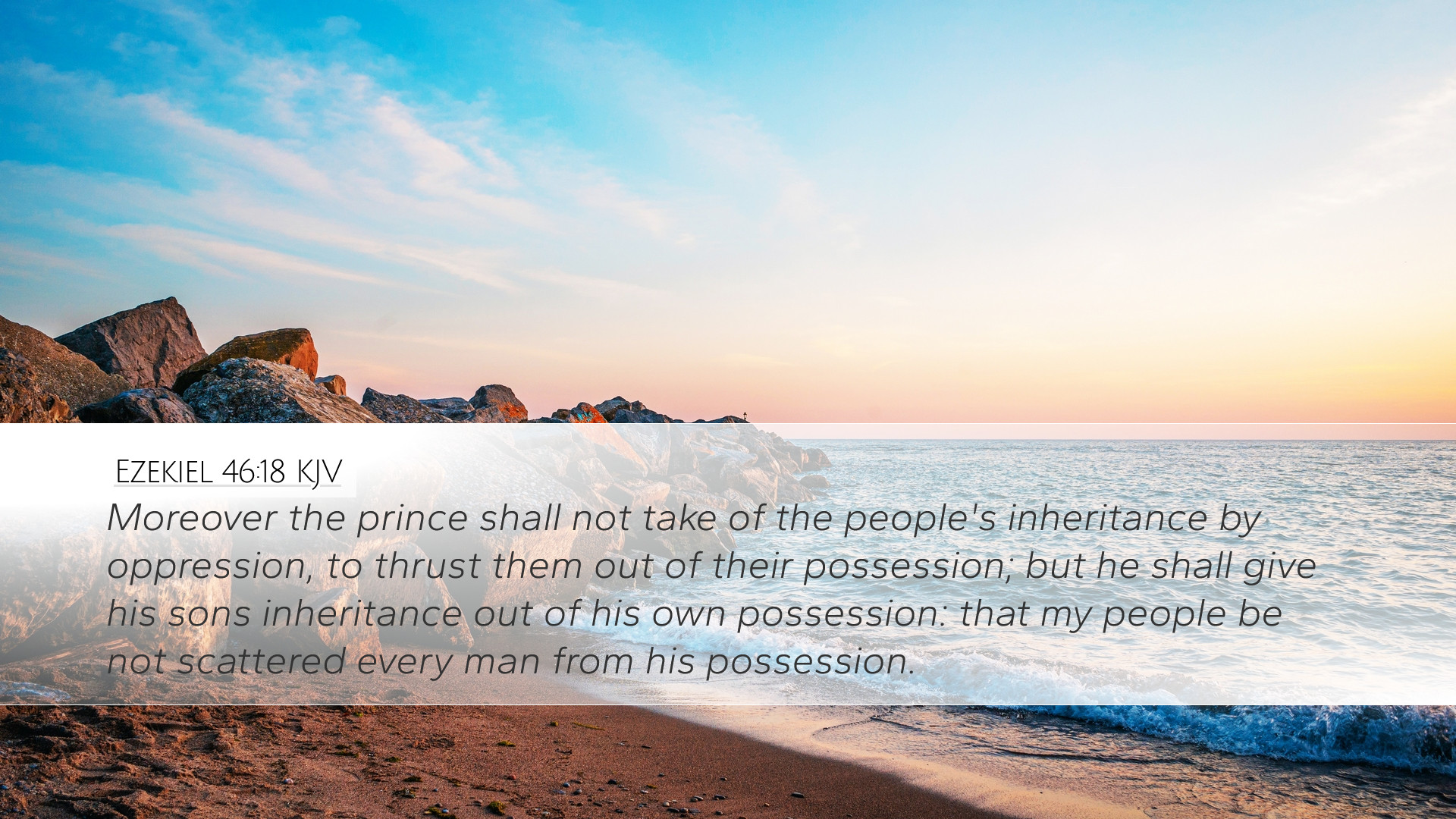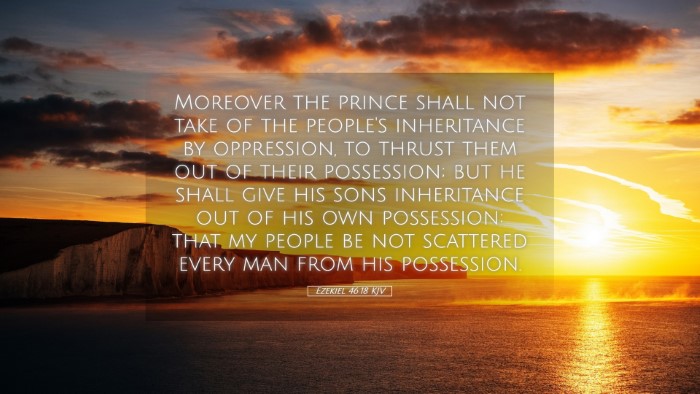Commentary on Ezekiel 46:18
Ezekiel 46:18 states, "Moreover the prince shall not take of the people's inheritance by oppression, to thrust them out of their possession; but he shall give his sons inheritance out of his own possession: that my people be not scattered every man from his possession."
This verse provides profound insights into the nature of leadership and justice in the context of ancient Israel. It highlights the responsibilities of the prince, emphasizing moral integrity and fairness in governance.
Key Themes
- Justice and Equity: The first significant theme in this verse revolves around justice. The prince is instructed not to oppress the people or take advantage of his position to claim their inheritance. This touches on the moral obligation of leaders to uphold justice and protect the rights of their constituents.
- Preventing Displacement: The phrase "to thrust them out of their possession" signifies a concern for stability within the community. The preservation of each family's land and possession was crucial for social and economic stability in Israel.
- Proper Inheritance: The mention of the prince providing for his sons from his own possession reinforces the principle of rightful inheritance. It reflects the idea that leaders should not exploit their authority for personal gain but should ensure that their families are cared for from their own resources.
- Community Cohesion: The admonition that "my people be not scattered" points to a divine desire for community cohesion and stability within the nation. It connotes that scattering leads to disunity and chaos, undermining the society's integrity.
Insights from Commentaries
Matthew Henry
Matthew Henry emphasizes that the prince's role is not to seize property or extort from the people but to guide them with righteousness. He interprets this as a reflection of God's justice, noting that rulers should have a keen sense of responsibility towards their subjects. Henry suggests that the prince must model godly leadership by ensuring that the welfare of his people is prioritized over personal ambition.
Albert Barnes
Albert Barnes elaborates on the implications of this verse regarding the distribution of inheritance. He argues that the established order aimed to prevent any form of tyranny or corruption among leaders. Barnes points out that the responsibility of leadership comes with the obligation to ensure that all citizens retain their rightful possessions, emphasizing that social equity is a vital concern in divine governance.
Adam Clarke
Adam Clarke adds a historical and contextual layer to the interpretation, noting that during Ezekiel's time, there was a risk of leaders abusing their power. He mentions how this instruction serves as a protective measure for the people against potential exploitation. Clarke highlights the theological principle that God's people should not be deprived of their rights, linking it to the broader idea of stewardship and divine justice.
Theological Implications
This verse carries significant theological weight, particularly regarding the nature of God as a protector and sustainer of justice. The instruction to the prince reinforces the concept that earthly leadership should reflect divine principles. When leaders act justly and protect the vulnerable, they align with God's character and purposes.
Moreover, the passage speaks to the ongoing relevance of these issues in contemporary governance. Pastors, students, and theologians can draw parallels to modern-day leadership by examining how authority is exercised and the importance of safeguarding the rights of the marginalized within society.
Applications for Ministry
- Advocacy for Justice: This verse can inspire ministers and church leaders to advocate for justice within their communities. By modeling equitable practices, church leaders can reflect God's character and challenge systems of oppression.
- Teaching on Stewardship: Educators and theologians can utilize this scripture to teach about ethical stewardship, emphasizing the responsibility of believers to manage their resources wisely and to care for those less fortunate.
- Community Building: Congregations can be encouraged to foster inclusive environments where everyone maintains a sense of belonging and ownership, preventing the "scattering" that comes from division and disunity.
Conclusion
Ezekiel 46:18 serves as a powerful reminder of the ethical responsibilities inherent in leadership. By examining the insights from historical commentaries, modern readers can glean both ancient wisdom and contemporary applications that remain pertinent in today's sociopolitical landscape. The call for justice, rootedness, and community integrity transcends cultures and time, urging leaders and believers alike to cultivate an environment reflective of God's kingdom on earth.


